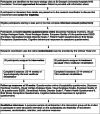Protocol for a randomised controlled feasibility study of psychologically informed vestibular rehabilitation for people with persistent dizziness: INVEST trial
- PMID: 34399847
- PMCID: PMC8364941
- DOI: 10.1186/s40814-021-00896-y
Protocol for a randomised controlled feasibility study of psychologically informed vestibular rehabilitation for people with persistent dizziness: INVEST trial
Abstract
Background: Dizziness is a common complaint that often persists and leads to disability and distress. Several cognitive and behavioural responses may contribute to the neurobiological adaptations that maintain persistent vestibular symptoms. This paper will present the protocol of a two-arm parallel group feasibility randomised controlled trial designed to determine whether a fully powered efficacy trial is achievable by examining the feasibility of recruitment, acceptability and potential benefits of an integrated cognitive behavioural therapy and vestibular rehabilitation (CBT-VR) treatment for people with persistent dizziness.
Methods: Forty adult patients will be recruited from a tertiary vestibular clinic with persistent movement-triggered dizziness for 3 months or longer who have moderate-high levels of dizziness handicap. Participants will be 1:1 randomised, using a minimisation procedure, to six sessions of either CBT-VR (intervention arm) or VR only (control arm). Measures will be collected at baseline and 4 months post randomisation. The primary feasibility outcomes include descriptive data on numbers meeting eligibility criteria, rates of recruitment, numbers retained post randomisation, treatment adherence and an acceptability questionnaire. Treatment effects on self-report outcomes will be estimated to determine that 95% confidence intervals for the effects are consistent with anticipated effects and minimum clinically important differences, and to provide information needed for the power calculation of an efficacy trial. A nested qualitative study will be conducted post-intervention (intervention group only) to explore the acceptability of the intervention and identify any areas in need of improvement.
Discussion: If a trial of CBT-VR is feasible, acceptability data will be used to enhance the intervention if needed and refine the multicentre RCT protocol. Future studies will need to consider the training required for other physiotherapists to deliver the intervention.
Trial registration: ClinicalTrials.gov, ISRCTN 10420559.
Keywords: CBT; Dizziness; Feasibility; PPPD; Protocol; Rehabilitation; Vertigo; Vestibular.
© 2021. The Author(s).
Conflict of interest statement
The authors declare that they have no competing interests.
References
Grants and funding
LinkOut - more resources
Full Text Sources


